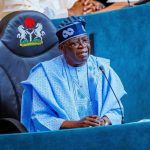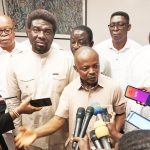The ECOWAS Court of Justice has delivered a landmark judgment, condemning the Federal Government under President Muhammadu Buhari for infringing on the basic human rights of young individuals who participated in the EndSARS protests in October 2020.
The three-member panel of Justices unanimously agreed that the lawsuit filed by Obianuju Catherine Udeh, Perpetual Kamsi, and Dabiraoluwa Adeyinka, all participants in the EndSARS protest, had merit.
The court said that the Federal Republic of Nigeria violated Articles 1, 4, 6, 9, 10, and 11 of the African Charter on Human and Peoples’ Rights (ACPHR).
These articles cover the right to life, security of person, freedom of expression, assembly, and association, the duty of the state to investigate, the right to an effective remedy, and the prohibition of torture.
In their lawsuit, the plaintiffs claimed that the peaceful protests they participated in at the Lekki Toll Gate in Lagos State on October 20 and 21, 2020, violated their human rights.
The ECOWAS Court of Justice, in a lead judgment delivered by Judge Rapporteur, Justice Koroma Mohamed Sengu, rejected the applicants’ claim that their right to life, as protected under Article 4 of the ACHHR, was infringed upon by the FG.
However, it ordered FG to pay each of the applicants the sum of N2 million as compensation for violations of their security of person, prohibition of torture and cruel, inhuman, and degrading treatment, rights to freedom of expression, assembly, and association, duty to investigate human rights violations, and right to effective remedy.
Furthermore, the court mandated the FG to fulfil its obligations under the ACPHR by conducting a thorough investigation and prosecuting the officials responsible for the human rights violations.
The court also directed the FG to provide a report within six months, detailing the measures taken to implement the judgment and comply with the court’s orders.
The applicants had alleged that the respondent committed several human rights violations during the peaceful protests against the SARS Unit of the Nigerian Police Force at Lekki Toll Gate, Lagos State.
The protests, sparked by the alleged killing of Daniel Chibuike, were a response to police harassment and brutality.
In the lawsuit, the first applicant alleged that soldiers fired live ammunition at protesters, causing fatalities and injuries, which she broadcast live on social media.
She testified that she began receiving menacing phone calls after live-streaming the protests, forcing her to go into hiding and seek asylum.
Similarly, the second applicant, who was responsible for the protesters’ welfare, recounted how soldiers opened fire during a power outage, resulting in her hospitalization due to severe tear gas inhalation.
The third applicant testified that, with the assistance of her colleagues, she took charge of providing aid to the protest victims.
She claimed that, as a result, security agents repeatedly threatened her and closely monitored her activities.
As a result, the applicants requested that the court issue declaratory reliefs against the FG, acknowledging the violations of their fundamental human rights, and award them compensation for the harm suffered.
In its lawsuit response, the FG, through its legal representatives, denied all candidates’ allegations and claims, contesting their version of events.
According to the court, the protesters unlawfully gathered at Lekki Toll Gate on October 20, 2020, under the guise of protesting against SARS.
FG further argued that its agents adhered to established protocols and did not fire on or kill protesters, contrary to the applicants’ claims.
Additionally, the government alleges that the first applicant provoked the crowd by playing music and using her Instagram platform to spread dissent against law enforcement agents, who were allegedly targeting fleeing members of Boko Haram and bandits.
The government also argued that the second applicant’s provision of logistics and welfare packages constituted support for the violent protest, implying that she was complicit in the unrest.
Furthermore, it claimed that the soldiers’ presence was necessary to restore order until the police arrived and denied any allegations of harm inflicted on protesters or the alleged refusal to allow access to ambulances.
More so, FG denied that the 3rd applicant’s presence was peaceful, asserting it was meant to escalate violence.
The Lagos State Government, it argued, managed the treatment and care of the injured, insisting that the applicants failed to provide credible evidence to support their claims and the relief they sought from the court.
The court delivered its judgment on Wednesday, stating that it could not find sufficient evidence to establish a violation of the right to life as the applicants failed to provide concrete evidence to support their claims.
Therefore, the court did not find the FG liable for any alleged violations of the right to life.
Nevertheless, it found that the respondent (FG) violated several ACHPR articles, leading to fundamental human rights violations.
The Court further ruled that the applicants were indeed denied access to an effective remedy, and therefore ordered the FG to provide reparations to the applicants for the violation of their fundamental human rights.
The court acknowledged that the government failed to meet its obligations to protect and uphold the rights of the applicants.
The other members of the panel who agreed with the lead judgment were Justice Dupe Atoki and Justice Ricardo Claúdio Monteiro Gonçalves.























Leave a comment